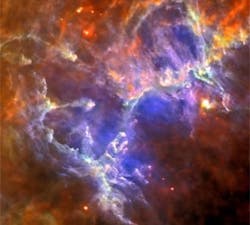Sydney, Australia--A proposed new laser-assisted time-keeping system (a single-ion clock) from The University of New South Wales and collaborators (UNSW) tied to the orbiting of a neutron around an atomic nucleus could have such unprecedented accuracy that it neither gains nor loses 1/20th of a second in 14 billion years—the age of the Universe. "This is nearly 100 times more accurate than the best atomic clocks we have now," says one of the researchers, Scientia professor Victor Flambaum, who is head of Theoretical Physics in the UNSW School of Physics.
In a paper to be published in Physical Review Letters with U.S. researchers at the Georgia Institute of Technology and the University of Nevada, Flambaum and UNSW colleague Vladimir Dzuba report that their proposed single-ion clock would be accurate to 19 decimal places. "Atomic clocks use the orbiting electrons of an atom as the clock pendulum. But we have shown that by using lasers to orient the electrons in a very specific way, one can use the orbiting neutron of an atomic nucleus as the clock pendulum, making a so-called nuclear clock with unparalleled accuracy." Flambaum adds, "It would allow scientists to test fundamental physical theories at unprecedented levels of precision and provide an unmatched tool for applied physics research."
The exquisite accuracy of atomic clocks is widely used in applications ranging from GPS navigation systems and high-bandwidth data transfer to tests of fundamental physics and system synchronization in particle accelerators. "With these clocks currently pushing up against significant accuracy limitations, a next-generation system is desired to explore the realms of extreme measurement precision and further diversified applications unreachable by atomic clocks," says professor Flambaum.
Because the neutron is held so tightly to the nucleus, its oscillation rate is almost completely unaffected by any external perturbations, unlike those of an atomic clock’s electrons, which are much more loosely bound.
SOURCE: The University of New South Wales; https://newsroom.unsw.edu.au/news/science/nuclear-clock-may-keep-time-universe
About the Author

Gail Overton
Senior Editor (2004-2020)
Gail has more than 30 years of engineering, marketing, product management, and editorial experience in the photonics and optical communications industry. Before joining the staff at Laser Focus World in 2004, she held many product management and product marketing roles in the fiber-optics industry, most notably at Hughes (El Segundo, CA), GTE Labs (Waltham, MA), Corning (Corning, NY), Photon Kinetics (Beaverton, OR), and Newport Corporation (Irvine, CA). During her marketing career, Gail published articles in WDM Solutions and Sensors magazine and traveled internationally to conduct product and sales training. Gail received her BS degree in physics, with an emphasis in optics, from San Diego State University in San Diego, CA in May 1986.
